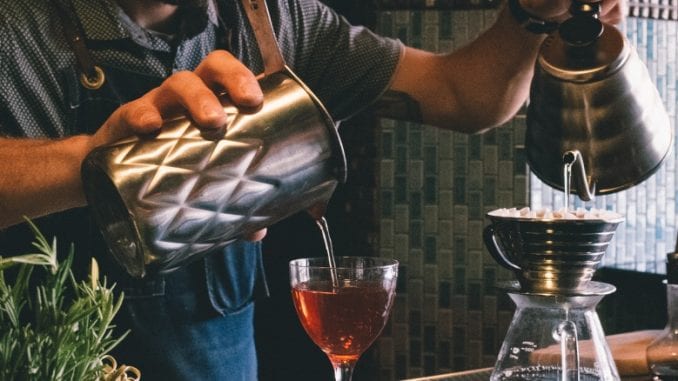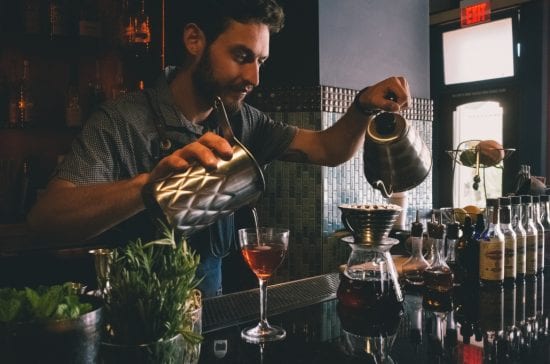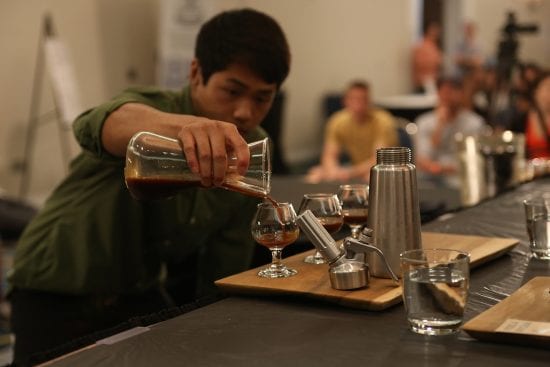
Our multi-part article “Life Behind Bars” examines the canon of coffee and cocktail service, where the two intersect, and what both fields can learn from each other—from quality of craft to hospitality and context.
BY KAY CHEON
SPECIAL TO BARISTA MAGAZINE
Photos by Kay Cheon
Coffee and cocktails have both been undergoing a “craft” renaissance for some time now, with motivated and creative professionals behind both bars working to enhance their products by developing their skills, techniques, and thirst for experimentation.
In coffee, this has been done through the application of numbers and rigorous checks, with scales, refractometers, volumetrics, and density separators finding their way into even the more minimal cafés. Similarly in the cocktail realm, bartenders are delving into food science and gastronomy, using technology like centrifuges and rotary evaporators to create new infusions of spirits and add different layers of flavor into their cocktails.
We talked to some professionals from both craft cocktails and specialty coffee to get some insights and expertise on the differences and similarities between the two worlds.
Skillset and Context
Whereas in Italy you may find bartender/baristas who juggle both coffee and alcohol service at their respective establishments, in the United States you’re more likely to find dedicated professionals in each space. Amanda Whitt, a beverage professional with experience as a coffee competitor as well as in bar programs such as Amor y Amargo, observes that baristas in cafés have a difficult job in that they’re required to “have the skills of two different types of bartenders: the turn-and-burn dive bartender getting people in and out quickly, as well as having to operate with the professionalism and technique of a craft cocktail bartender.”
Amanda has been able to work in a wide variety of establishments that give her a strong insight into what styles of service work for their context. She says that more and more places are taking a holistic approach to their service, giving equal attention to coffee and food-and-beverage quality. Amanda also notes that this interdisciplinary skillset helps baristas interested in competition, as well as handing bartenders a wider range of flavors and tools to work with.

Service
Seeing as customers are typically paying more for their cocktails than for their coffee, bartenders can face a higher degree of pressure to deliver a product that exceeds guests’ expectations. These expectations are also set by the service model: While cafés are often designed to facilitate customers paying and then taking their items to go, bartenders typically have longer face time with their customers as they spend more time serving them and interacting with them.
Sam Lewontin of Everyman Espresso in New York thinks coffee purveyors should strive for a high quality of service on par with what bartenders and other beverage professionals are expected to provide. Lewontin’s goals with Everyman’s hospitality and service aim to “provide the best hospitality within each store regardless of these preconceived notions of service, as well as avoiding from pulling from the broad canon of what is expected in coffee shops.” Similarly, Koan Goedman of Huckleberry Roasters and Bar Fausto in Colorado mentions that “coffee professionals are starting to recognize the elements of service present in bar and restaurant settings that could then really improve the hospitality they offer to their guests.”
Barista Competition, Cocktail Creation
In modern-day barista competitions, baristas are expected to demonstrate an understanding of terroir and production methods. Similarly, bartenders are expected to be able to explain differences between different spirits or even between two examples of the same category of liquor. Lewontin makes sure to note the wholly different environment between actual service and competition, stating flatly, “Competition is not café service.” Many baristas and barista competitors draw from experience behind both bars, both in competition routines as well as in their occupations. Whether that means developing drinks for a café with a liquor license, heading up a restaurant’s beverage program, or even splitting time between two different establishments, these baristas are faced with the large undertaking of expanding on their coffee knowledge as well as learning the history of different spirits and memorizing recipes for drinks.

Learning and Experience
There is a strong benefit to baristas seeking to learn about cocktails and bartending, as well as to bartenders spending time examining the efficiency of a cafe’s assembly line from order to drink produced. Baristas can learn much in the way of flavor balance, poise, and hospitality from the best bartenders, just as the best bartenders learn from chefs and draw from culinary ideas. George Piperis, bar director at Somerset in Santa Barbara, notes: “Ego is the biggest killer of learning, whereas compared to a lot of bartenders, most baristas don’t have much of an ego.” Both baristas and bartenders are expected to multitask and conduct service and serve exceptional drinks, but there are more and more examples of individuals combining the two or benefitting from the knowledge gleaned behind the other bar.
We’ll continue this exploration in the next installments of “Life Behind Bars” soon.
 ABOUT THE AUTHOR
ABOUT THE AUTHOR
Kay Cheon works as a coffee educator and bartender in Santa Barbara, Calif., where he is privileged enough to share what little knowledge he has with the people around him, taste good things, and work on bettering service alongside them. His current favorite drinks are tasty batch-brewed coffee and shaken bittersweet cocktails.

